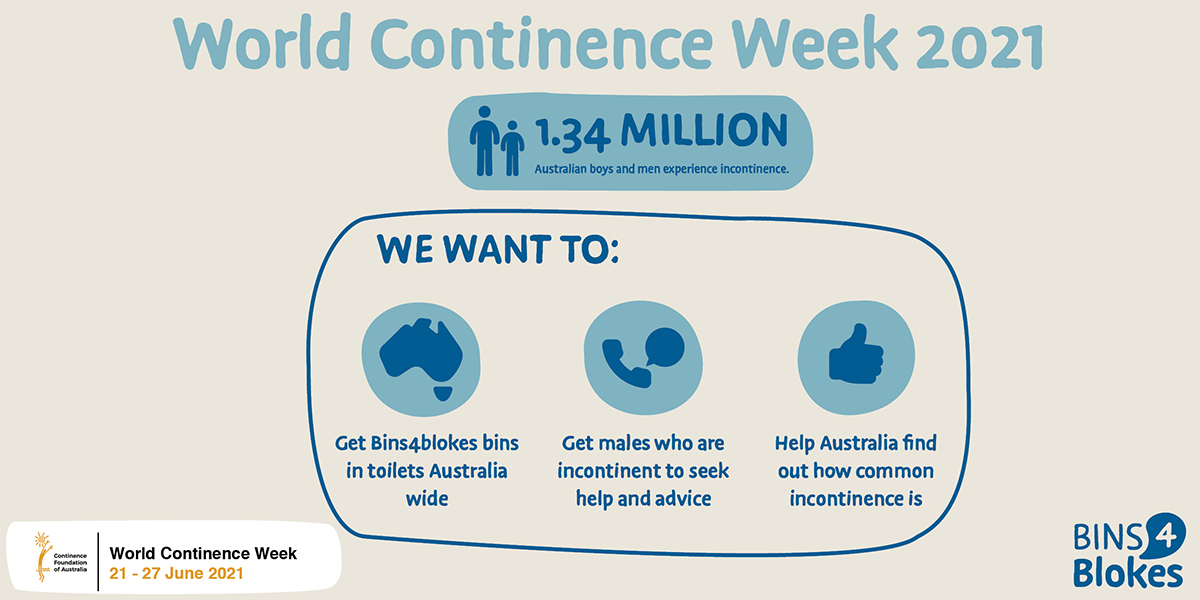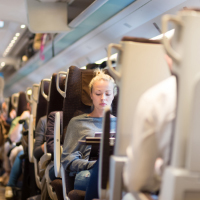Incontinence can significantly impact a person’s quality of life and currently affects 1 in 4 Australians.
However in many cases, incontinence can be prevented, better managed and even cured. There is a lot of help available and this article aims to provide you with various points of contact and helpful information on how to manage this condition.

World Continence Week
World Continence Week is 21 – 27 June 2021, and aims to raise awareness of this issue facing one million men around Australia.
The latest campaign from the Continence Foundation of Australia is ‘Bins for Blokes’ promoting the installation of incontinence bins in male public toilet facilities – check out the video below.
What is Incontinence?
Incontinence is the involuntary loss of bladder and bowel control. It is the accidental or involuntary loss of:
- urine (wee) from the bladder – known as urinary incontinence
- faeces (poo) or flatus (wind) from the bowel – known as faecal incontinence.
Incontinence can range in severity from a small leak to complete loss of bladder or bowel control.
Urinary incontinence (poor bladder control) is a common condition affecting 1 in 3 women, 1 in 10 men and 1 in 5 children in Australia. Faecal incontinence (poor bowel control) is more common than most people think – affecting approximately 1 in 20 Australians.
Tips for those Suffering Incontinence
With some planning, incontinence doesn’t need to stop you from living life to the fullest. Here are some helpful tips for those suffering Incontinence-
1. Create a Routine
If you have just been diagnosed, you’re probably feeling anxious about how to manage those occasional accidents. Find and work with a continence health professional to explore different options and come up with a tailored plan that supports your needs and lifestyle. Consider different scenarios and situations like: Home life, work life, exercise and sport, and plan out the routine using some simple strategies like – knowing how long you’ll be out for and ensuring you have enough continence products, finding out where closest toilets will be and how accessible they are, altering your diet or fluids and possibly testing new strategies at home before leaving.

2. Continence Products
For some people, it is necessary to use continence products such as pads, pants, catheters, sheath (condom) drainage, or bed protection to manage their incontinence. Get an assessment by a Nurse Continence Specialist to make sure the best product is chosen. The National Continence Helpline can also provide information on products and local and national continence product suppliers. In this video, Nurse Continence Specialist Anita Francis introduces a range of continence products and advises how to choose an appropriate product for you or the person you care for.
3. Toilet Accessibility
If you find that sometimes you (or a person you are caring for) have difficulty reaching the toilet in time there are things you can do to help.
- Adjust the toilet to correct height by using a raised toilet seat and installing grab hand rails to make sitting down and getting up easier
- Provide support for proper seating position with a foot stool if safe to do so
- Ensure the area is clean and has good lighting
- Ensure toilet is safe by removing clutter
- Install an outward opening door.
You may also like to consider a toilet alternative in the form of Commodes or hand held urinal.
The National Public Toilet Map shows the location of more than 19,000 toilet facilities across Australia. This is useful for people with incontinence, travellers, and also convenient for people with young families. You can access the map via the National Public Toilet Map website or by downloading the Toilet Map app.
4. Travel Tips
Travel can be an anxious time for those coping with Incontinence. With some planning however, you can make your trip more relaxing and enjoyable. Find the travel checklist below –
- 6-8 weeks in advance of your trip discuss your travel plans with your doctor. You may need vaccinations or booster shots depending on the destination.

- Talk to your doctor about medication to take away with you. Do you need prescription medicines or products for constipation, vomiting or diarrhoea? Keep your medicines in their original packaging when travelling overseas.
- Book early and advise your travel agent of your needs. Book seats on the aisle, near a toilet or near the front of the bus/plane.
- Plan each stage of your trip accordingly. If you wear absorbent pads for bladder leakage, allow an extra supply for unexpected delays.
- Enquire about possible extra luggage allowance when booking if you’re taking a large supply of continence products.
- Inform airline staff of your needs so you can board the plane first. You’ll be able to calmly organise and arrange your continence products, clothing and carry-on luggage.
- Choose clothes in dark colours (to disguise any leakage) that are easy to remove and comfortable to wear (elastic waists, track pants or longer, loose-fitting tops).
- For women travelling in the tropics, a sarong is handy to hide a leakage accident. It can also be placed on a chair. A jacket or cardigan can be tied around the waist to disguise an accident.
- Take along a small toilet bag in your carry-on bag, plus a change of clothing. Disposable wipes are handy generally and especially good for faecal incontinence.
- Drink plenty of ‘good’ fluids (water is best) as air conditioning is dehydrating. Don’t be tempted to cut down on fluids to reduce urine (wee) leakage as it can actually make things worse.
- Eat light meals so you won’t feel uncomfortable, bloated or queasy. Your digestion and body clock can be upset when travelling.
- Avoid bladder irritants such as coffee, tea, alcohol, chocolate drinks, fizzy soft drinks and sports drinks. Spicy or acidic foods are best avoided too.
- Stretch and walk as much as you can to help with circulation and digestion. Seated exercises (like those recommended by airlines) are good.
Further Help is Available
Contact the National Continence Helpline on 1800 33 00 66. The National Continence Helpline is staffed by Nurse Continence Specialists who can provide free and confidential information, advice and support as well as a wide range of continence-related resources.
Pelvic Health Physiotherapy –
Incontinence, although common, should not be considered a normal part of ageing and any bladder problem big or small, warrants attention to help get the problem under control. If you are in need of assistance, we have Pelvic Health Physiotherapists trained to manage or even cure this condition, so please call to book your appointment – 3869 1099 or Read More>>
Source- https://www.continence.org.au/

